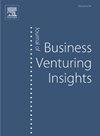Font of innovation or algorithmic deforestation? The ecosystem impacts of artificial intelligence in entrepreneurship
Q1 Business, Management and Accounting
引用次数: 0
Abstract
Artificial intelligence (AI) is increasingly embedded in the infrastructures, practices, and decision-making routines of founders, firms, and entrepreneurial ecosystems. For entrepreneurship, this appears to be a tremendous boon to value creation. By widening the aperture of individual entrepreneurs beyond the narrow limits of human cognition, assistive algorithms – and particularly the ground-breaking, readily accessible capabilities of Generative AI (Gen AI) – appear poised to deliver game-changing exploratory tools, enhanced predictive insights, operational efficiencies, and resource-preserving decision-support tools. Yet, the long-term, society-wide impacts are far less clear. One cause for concern is the variance-minimizing features of AI, a foundational design principle that reduces deviation and enhances the predictive stability of AI tools. In this, we identify a paradox wherein AI tools often enhance the individual creativity of entrepreneurs but, at scale, may erode collective entrepreneurial dynamism by filtering out non-algorithmic, highly serendipitous, mutation-generating, and variance-maximizing behaviors. Drawing upon the principles of rainforest logics, we theorize how AI's growing influence on entrepreneurial judgment, strategy, and ecosystem design may lead to a system-wide homogenization in decision-making and a decline in radical experimentation. With this, there is the danger of a corresponding increase in what we have dubbed algorithmic deforestation, involving systemic risks to the vitality and mutation-generating capacity of entrepreneurial ecosystems through the unintentional suppression of cognitive and behavioral diversity.
创新的源泉还是算法的滥伐?人工智能对创业生态系统的影响
人工智能(AI)越来越多地嵌入到创始人、公司和创业生态系统的基础设施、实践和决策程序中。对于企业家来说,这似乎是价值创造的巨大福音。通过扩大个体企业家的视野,超越人类认知的狭隘限制,辅助算法——尤其是突破性的、容易获得的生成式人工智能(Gen AI)的能力——似乎准备好提供改变游戏规则的探索工具,增强预测洞察力,运营效率,以及节约资源的决策支持工具。然而,其对整个社会的长期影响远不那么明显。值得关注的一个原因是人工智能的方差最小化特性,这是一种基本的设计原则,可以减少偏差并提高人工智能工具的预测稳定性。在这方面,我们发现了一个悖论,即人工智能工具通常会增强企业家的个人创造力,但在规模上,可能会过滤掉非算法、高度偶然、产生突变和方差最大化的行为,从而削弱集体创业活力。根据热带雨林逻辑的原则,我们将人工智能对企业判断、战略和生态系统设计的影响越来越大,这可能导致整个系统的决策同质化,并导致激进实验的减少。这样一来,我们称之为“算法毁林”的危险就会相应增加,通过无意中抑制认知和行为多样性,对创业生态系统的活力和产生突变的能力构成系统性风险。
本文章由计算机程序翻译,如有差异,请以英文原文为准。
求助全文
约1分钟内获得全文
求助全文
来源期刊

Journal of Business Venturing Insights
Business, Management and Accounting-Business and International Management
CiteScore
11.70
自引率
0.00%
发文量
62
审稿时长
28 days
 求助内容:
求助内容: 应助结果提醒方式:
应助结果提醒方式:


